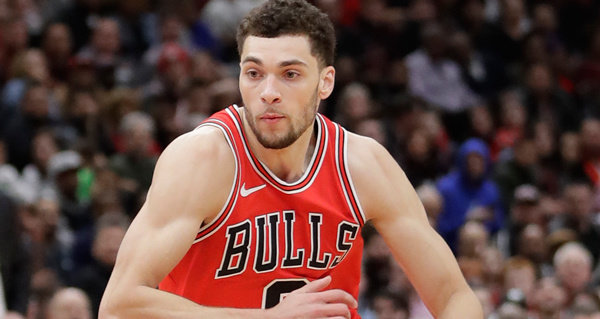While we know the general contours of any offseason well in advance, the annual Dunc’d On tradition of a Mock Offseason has proven to be an enlightening and clarifying experience as both the preparation and negotiations themselves put the market forces to the text.
Here were my main takeaways from the 2018 iteration:
- The Have-Nots Having Space
While the 76ers and Pacers are playoff teams with spending power, many of the major players this offseason are teams that are not exactly pushing for the playoffs in the immediate, which significantly changes the situation for free agents. Chicago, Atlanta and Sacramento will presumably use the vast majority of their cap space, but will likely focus on accumulating assets by taking on bad already-signed contracts and possibly offer sheets to restricted free agents. This summer many of the teams looking to offload money are doing so to reduce or eliminate their luxury tax bill rather than clearing cap for free agents, so those moves will not create nearly as much spending power. The best of the best will absolutely get paid but that dynamic could be massive for the next tier, all of whom are presumably expecting six figures per season rather than the Mid-Level exception or less. That could lead to protracted negotiations, more restricted free agents taking their qualifying offer and some mistakes similar to Nerlens Noel reportedly declining a lucrative offer from Dallas early last offseason.
- 2019
Another huge factor that will constrict the market is the possibility of usable cap space next summer, when the awful contracts signed in 2016 are closer to coming off the books and current estimates have the cap rising to $108 million. A top-heavy free agent class that will probably include Kawhi Leonard, Kyrie Irving and Jimmy Butler, plus whoever signs one-year contracts this offseason, could inspire franchises all over the league to keep their powder dry. The prospect of 2019 is a more significant one for teams with a credible chance at max players but it can also be used as the justification for keeping tight purse strings this summer for franchises not looking to spend and could be part of the rationale for the Suns, Magic, Kings and many others. Whatever the reason, a reluctance to sign or take on long-term money could significantly constrict the options for players and teams alike.
One other factor to consider here is that a batch of teams have bad multi-season contracts on their books they would like to trade but higher asking prices to take on two-year deals could lead them to waiting another season to make moves. Keep an eye on whether any of the big non-expiring contracts like Luol Deng, Ian Mahinmi, Meyers Leonard or Ryan Anderson move and if so what ransom the trading team has to give up to make it happen.
- Years vs. Dollars
Teams and players clash on the key terms of the annual salary and duration of contracts (some enterprising folks have even made merchandise on the concept) with agents pushing hard to maximize both but the two sides eventually finding the balance for that specific situation. With so little money available this summer, that balance will shift for those non-max players who cannot get what they are looking for. Some franchises will still want short-term contracts for various reasons but forward-thinking front offices could maximize this opportunity by inking longer contracts at what will eventually be below market value contracts. Portland did this well in 2015 with Al-Farouq Aminu and Ed Davis since the cap spike made those deals look far better a year later. This time around, that could end up being a major point of contention in negotiations for Derrick Favors, Marcus Smart, Jabari Parker, Kentavious Caldwell-Pope and many others.
- Maximizing leverage
While the overall market will be brutal for players this summer, certain individuals have leverage to make their negotiations different. Trevor Ariza is the central example of this dynamic as he played an important part in the Rockets success last season and they cannot truly replace him using an exception due to positional scarcity. Small forwards will generate interest but Ariza’s leverage with Houston will do the heavy lifting on a deal, paralleling Andre Iguodala last summer. DeMarcus Cousins would have been in a similar boat before tearing his Achilles but those forces could push the Pelicans to make a stronger offer relative to his market value, wherever that ends up, and the same could generally be true for his teammate Rajon Rondo after a successful season in New Orleans.
The other major group to watch in terms of leverage is restricted free agents like Zach LaVine and Dante Exum. Both could generate interest on the market but could also get left out in the cold, forcing their general manager to weigh the costs and benefits of a long-term contract compared to them taking the qualifying offer and potentially leaving next summer.
- Make Hay While the Sun Shines
It will be absolutely fascinating to see what agreements come in the early part of the July Moratorium and how those deals look later on in the process. Those July 1 agreements have been some of the most player-friendly contracts over the last few seasons (hello, Timofey Mozgov and Joakim Noah!) but the closest parallel to this summer could be 2015 when the teams that moved quickly like Portland did very well. 2018 may end up being some of column A and some of column B as the early agreements will happen before agreements establish market prices, leading to a mix of overpays and bargains. Watch the restricted free agents as well because some will agree early on to avoid the variance that comes with free agency and those contracts could end up being major outliers, especially if one side misreads the market.
- The Value of Individualism
One of the most important elements of free agency is how teams approach the difference between individuals and the group. For example, there are myriad big men, especially center-only big men, in this free agent class but they have different skill sets and ideal situations. While general managers will have a preference between Greg Monroe, Amir Johnson, Zaza Pachulia and Alex Len, will any of them pay extra for the one they want most? This could be even more significant for the point guards because they shift the offensive identity and scheme dramatically but the overall supply should be broadly in line with demand, thus reducing the leverage of each free agent. Interestingly, those forces will likely benefit superior teams by flattening the salary difference, thus reducing the sacrifice of joining a playoff team or contender.



